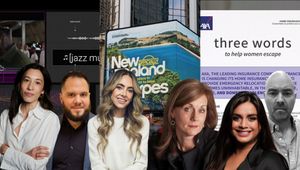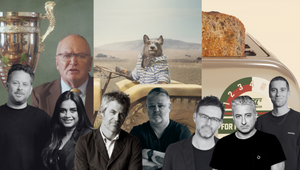
Volkswagen's 'RooBadge' Reduces Collisions with Kangaroos and Wildlife

A seemingly simple device that fits neatly over a Volkswagen’s front badge could save countless kangaroos, and regional Australian drivers, as well as hundreds of thousands of dollars in damage by emitting a warning signal to kangaroo species of a vehicle’s approach.
Developed over three years by Volkswagen Australia and the DDB Group in consultation with the University of Melbourne and WIRES, it is hoped that Volkswagen’s ‘RooBadge’ will help reduce collisions with kangaroos. These comprise some 90 per cent of on-road wildlife accidents in this country.
Connecting to an in-car app, RooBadge calibrates a vehicle's GPS coordinates with specifically developed kangaroo species distribution data. The ‘badge’ itself is a circular disc some 17cm in diameter that acts as protective shields, replacing the current Volkswagen roundel/badge.
This conveys a unique audio deterrent for the kangaroo species that inhabits the vehicle’s particular location across Australia.
A mixture of natural and artificial sounds is mixed in real time and projected in a high frequency audio signal from the front of the vehicle.
After extensive trials, permission has been obtained from The University of Melbourne Office of Research Ethics and Integrity to move into Stage Four trials, involving kangaroos in the wild. While supposed deterrent devices have existed for some time, none has been scientifically developed or proven.
“[RooBadge does] something no kangaroo deterrent has been able to do before,” Melbourne University’s Associate Professor Graeme Coulson said.
“It’s difficult to produce a single sound that will deter all kangaroos, because the species are different to each other. Using advancement in car technology we can change the sound deterrent by GPS location.
“We have worked on sounds that will be meaningful to Eastern Grey Kangaroos, things like dingo calls, alarm calls made by birds and the alarm thumps that kangaroos make to warn each other. We will then be able to tweak the sound for other species.”
DDB digital executive creative director, David Jackson, who led the project for DDB Sydney, said that what started as a speaker in a VW badge to reduce animal collisions on our roads, became an innovative, data and science-driven project.
“Over time this concept just grew and grew. By partnering with The University of Melbourne and WIRES we were able to build a protective audio shield that will have real impact on keeping people safe on our roads. We have also worked with The University of Melbourne Office of Research Ethics and Integrity and industry leaders to develop RooBadge through real-world tests to help optimise our hardware, software and sounds,” he said.
WIRES spokesman John Grants said, “Kangaroo collisions are increasing every year and with more motorists on the roads over the Easter holiday period we are expecting a spike in rescue calls for injured adults and displaced joeys. WIRES is grateful to automotive companies like Volkswagen for researching and developing solutions to better protect both our kangaroos and motorists.”

Director of Volkswagen Commercial Vehicles, Ryan Davies, said, “Why is Volkswagen investing time and energy in this project? Because we can and it’s the right thing to do.
“A collision with a ‘roo can be devastating. It is not easily forgotten once seen, and certainly not if experienced. Then there’s the possibility of a front-on collision with an approaching vehicle at country road speeds when one driver is trying to avoid striking a kangaroo. These are even more likely to have a fatal human outcome.”
The University of Melbourne’s Dr Helen Bender, who’s research has been used extensively in this project, said: “Roadkill is a problem all around the world.
“What’s interesting about deer relative to kangaroos is that they’re very similar in body size, head size, and ear size. What we know from science is that the ear shape in the head shape tells us that they probably have similar hearing ranges. So, whatever we learn has transferability to the deer as well.”
DDB executive creative director, Matt Chandler, said that innovation was at the forefront of this campaign for Volkswagen Commercial Vehicles and has been a huge commitment from the DDB team over the past four years.
“The team were incredibly passionate about this project from the start and we have since seen four years of deep innovation and product development to deliver something that is not only meaningful, but protects Australians driving Volkswagen utes on our roads. The list of people who have cared for this project over the years is long, and it is testament to the passion and belief the agency has had for it, led by the brilliant and inexhaustible David Jackson,” he said.















